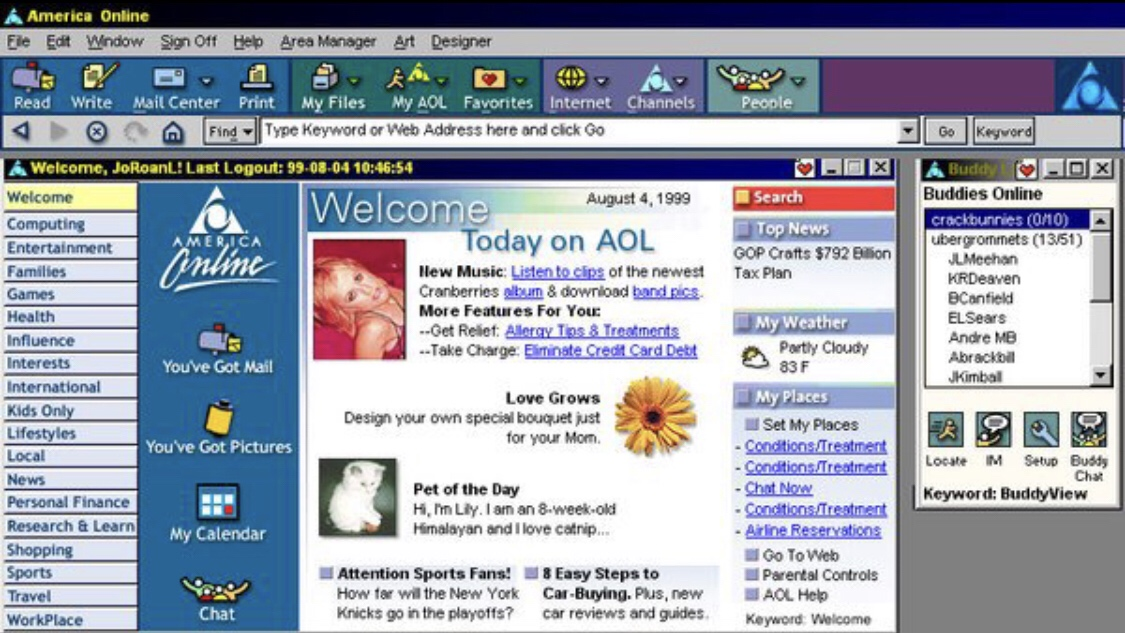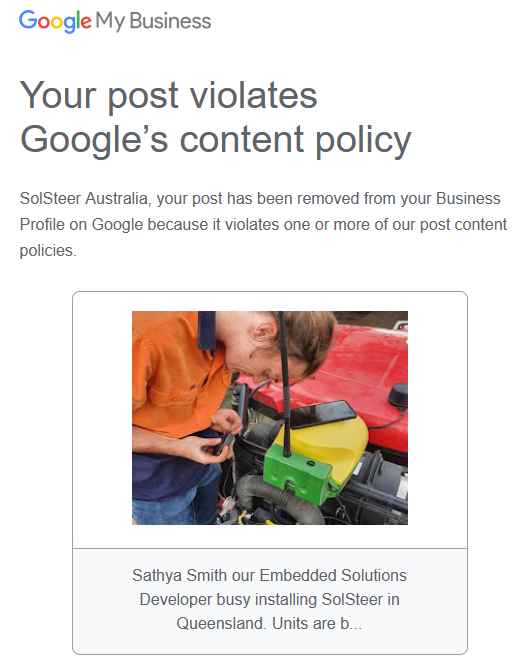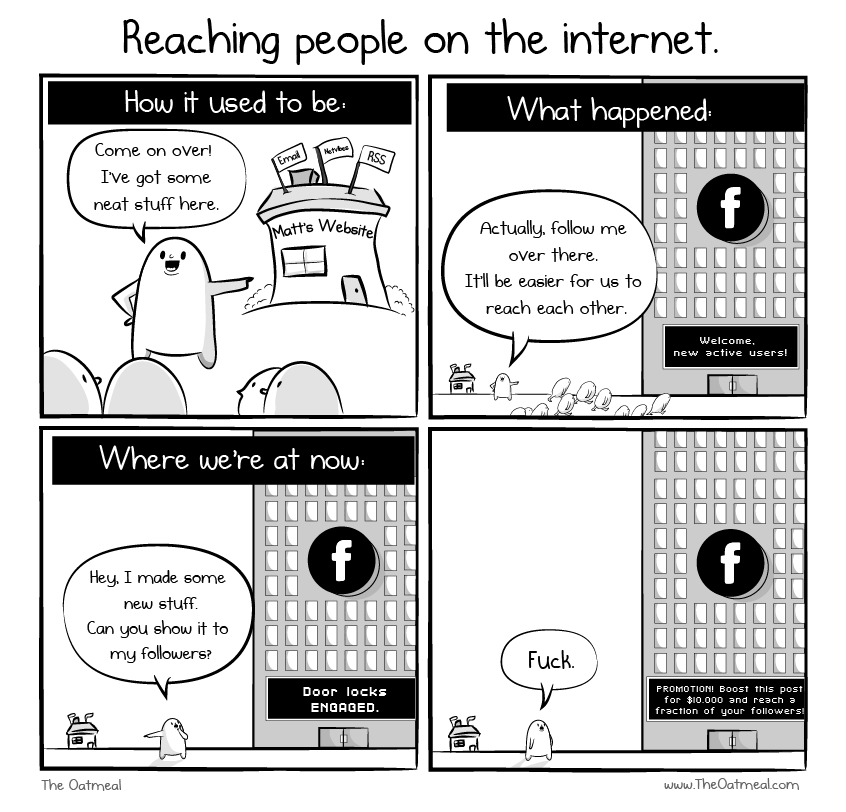Online walled gardens and small business markets
Walled Garden
A closed platform, walled garden, or closed ecosystem is a software system wherein the carrier or service provider has control over applications, content, and/or media, and restricts convenient access to non-approved applicants or content.https://en.wikipedia.org/wiki/Closed_platform
When Facebook first started it was hard to understand what the fuss was all about. To a veteran web developer (I guess 10+ years qualified as 'veteran' in the mid 2000s) it looked like just another aggregation of various existing internet capabilities. Why sign up when I was already doing everything that it offered in other (arguably better) ways?
- For connecting with friends there was Skype, or ICQ, or email.
- Special interest groups were covered by bulletin boards and listservs.
- Craiglist & friends plus regular websites took care of selling and marketing.
- Broadcast my pointless pontifications? That's what blogs were for.
It seemed that AOL and CompuServe had already proven that walled gardens didn't work on the internet. People didn't want to be trapped in one narrow version of online reality. In my view the beauty of the internet was that it removed monopolized control of information. There were already existing communities built around highly specific interests and topics. I didn't see that this diversity could adequately be served by a monolithic "one size fits all" platform.
This was another dumb fad that wouldn't catch on.
Right?

source: https://imgur.com/gallery/qIFR1VG
I'd be so rich if you got rewarded for being completely wrong.
Why did it work?
Who the fuck knows really. There are enough experts out there with opinions. I still don't really get why people flock to Facebook in their droves. Facebook made creating and participating in online communities free and easy. But neither of these explain the observed result. People will pay for value, and "easy" is just a technical issue. There is more to it. "Free" and "easy" were merely useful players in the main game. Facebook was aggressive and highly successful at exploiting human relationships, connections, and psychology - and they scaled it up and walled it off by leveraging the network effect like no-one before.
Network effect
In economics, a network effect ... is the phenomenon by which the value or utility a user derives from a good or service depends on the number of users of compatible products.https://en.wikipedia.org/wiki/Network_effect
So that's great. Is there a problem? Yeah, I reckon there are several.
There is already much written about the societal implications of platforms that actively encourage extremism/polarization via feedback loops within self validating echo chambers. Equally so with the implications of a medium that penalizes nuance and substance, and rewards superficial sensationalism.

That won't be discussed here. Nor will the obvious pitfalls of doing customer relations really badly in front of the whole world.
- 50 Ways Social Media Can Destroy Your Business
- How social media could ruin your business
- 19 Massive Corporate Social Media Horror Stories
The focus here is on the issue of small businesses putting their market audience in the hands of a 3rd party.
Lets go right to the worse case. You have been building your following on Facebook or Twitter for years. Countless hours of asking for likes, referring patrons and customers to your online profile. Posting content to keep people engaged and interested. Replying to messages, even spending real $ on ad campaigns to boost your messages and getting more people to 'Like' your page. One day you wake up and you're banned. No explanation. No recourse. No way to contact any of your online followers. No ability to get back any of the content you've posted there over the years.
- Spent $US46m. Booted off Facebook without explanation.
- Banned On Facebook
- How I Got Banned By Facebook
- Banned from Facebook?
- What I learned when my Facebook business page was deleted without my consent
- Facebook just deleted my business account … for the second time!
It doesn't have to be that extreme. Online services are run by algorithms. You optimize your whole online presence around what you think the online service wants and will promote. You buy ads, and hire a consultant to help. Then it changes. Suddenly you have no views and no traffic. And neither you, nor your pricey consultant, have any idea why.
Still too extreme? Ok, what about that mundane post you made about some company activity?

Sorry, the inscrutable site AI has decided it "violates one or more of our post content policies." Good luck trying to figure out why it got rejected or what you should do in future to avoid the same fate.

You're not in control, and the sands can shift without warning, and without reason. Won't happen to you? No, probably it won't. But then, probably you'll go through your entire career without your office building burning down. I bet you still have it insured.
You might feel like you're in a partnership of sorts. That you matter. You're actively promoting your page to your customers. You've stuck up the big "Like us on Facebook" stickers around your office. You might have even convinced customers to sign up to a social media site just so they can interact with you. But you're not a partner. You're the product. It's worse than that. The fact that you do the work of creating, posting, and promoting content makes you basically unpaid labor. If it wasn't for millions of people just like you posting free content there would be no reason for people to use these sites.
And once you've done all the work of building your presence and getting your market to interact with you there, what then? You have to pay FB money to reach the audience that you built on their platform.
Mathew Inman of "The Oatmeal" nailed it in this 2017 comic.

source: https://theoatmeal.com/comics/reaching_people
(Disclaimer: For his masterful handling of the 'FunnyJunk' incident, Inman will for evermore be an internet hero of mine).
The reality is that you handed over control. It seemed like a good deal at the time. It probably was. And deep in the back of your head you knew that somewhere along the line there was bound to be a bit of "bait-and-switchery" involved. But hey, it's free and it's easy and what's to lose? Fast track a couple of years and countless hr/$ invested and now there is quite a bit to lose. Worse, you let all those old fashioned networks and methods you used to rely on fall by the wayside. Your physical mailing list hasn't been updated in years. You and your competitors stopped advertising in the specialty periodicals. They went under. When you put all your eggs in one basket and hand over control, you take what you are given. The decision making processes of publicly listed internet companies do not take your small business needs into account.
We treat these big online services like some sort of public utility, or government service. They aren't. They're massive companies who have historically faced little real control or accountability. Think about that while you are messaging back and forth with your next customer. What valuable competitive information do you reveal in a conversation like that? Would you like your competition to see the transcript? Could Facebook ever end up selling that conversation to your competition? Given that you inevitably reveal intimate details about the nature and extent of your market, do you know that Facebook won't end up being your competition?
Sidenote: How brilliant is the "pay for performance" social media advertising racket? They tell you with great precision the demographics you will be targeting. You sign up. Presumably they do something. Then they give you your results (normally with reams of impressive drill-down statistics) and take your money. What's awesome is that the whole thing is controlled by them. You usually have no real ability to verify what they are telling you. Did you just pay to have a horde of subcontinental click farm denizens view your content? Who knows. Well someone might know. Just not you.
So. What to do.
1. Control your content.
Put no content on social media that you haven't created and stored elsewhere. Do not rely on anything vital being stored by Facebook/Instagram/TikTok/Twitter. Treat nothing that you post on these sites as "throw away" content. It isn't. It's valuable. If it was worth showing to your customers on those platforms, it is worth keeping on your own website. Blog it.
Content you created years ago may still be very relevant to your customers. Your customers are never going to find it on Facebook or Twitter. Host it yourself and make your own decisions about what resources to bubble to the top.
2. Diversify.
Don't let a single platform dominate your time and effort. And don't let any of them be core to your existence. Keep your own system (rolodex, website, CMS, whatever) at the center of your endeavors and treat online services as transitory ephemeral marketing opportunities.
3. Treat social media like a competitor.
Disclose as little as is necessary to meet your aims. Be suspicious. Be ready to flee at a moment's notice. Never promote their platform, always promote yourself.
4. Get your customers on to your platform.
No. You don't have to build your own Twitter. Your platform might be a Rolodex and a mobile phone. Whatever "platform" you have, get your customers on to it as quickly as possible. Sure, treat Facebook as a leads generator, but do whatever you can to get the customer into your own database, and interacting with you using methods that you control.
5. Use social media.
As in, "exploit (a person or situation) for one's own advantage". Drive it like you stole it. Use it like you could lose it, tomorrow. Don't put anything on there that you can't afford to lose, and do everything you can to get your users off that platform and on to yours. The online giants are using you in ways you've not yet even imagined possible. Using you is their business. Get some of your own back.